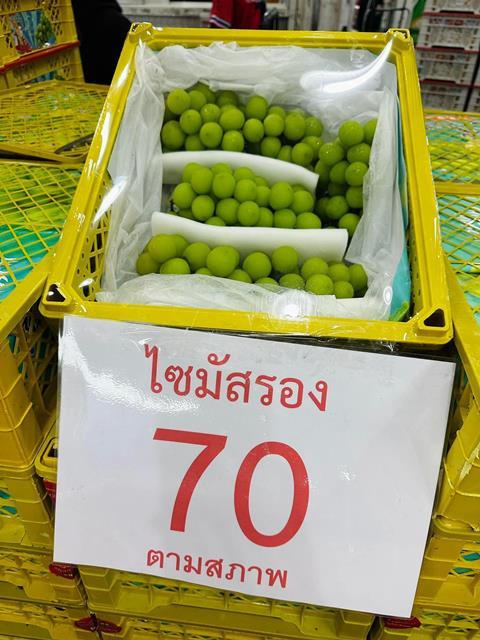Shipments of Shine Muscat grapes from China halted after Thailand Consumers Council raises alarm over harmful residues
NGO organisation Thailand Consumers Council (TCC) – together with the Thai Pesticide Alert Network (Thai-PAN) – has sparked a food scare over Shine Muscat grapes in Thailand after it reported finding harmful chemical residues in random retail samples taken for laboratory testing.

According to Thai media reports, TCC purchased 24 samples of Shine Muscat grapes from different retail settings – two from online shops, seven from fruit shops and fresh markets, and 15 from modern trade outlets (supermarkets) – on 2-3 October in Bangkok and surrounding areas.
TCC reported that 23 out of the 24 samples tested by the council were found to carry hazardous chemical residues beyond the acceptable legal limit.
In total, the tests detected 50 chemical residues, 22 of which are not regulated under current Thai law, the TCC said. Some samples reportedly included residues of chlorpyrifos and endrin aldehyde, which are banned under current food safety laws.
TCC secretary-general Saree Aongsomwang urged Thailand’s Food and Drug Administration to take legal action against importers who brought in the tainted grapes. She also called on grape importers to recall their products to be thoroughly inspected.
FDA secretary-general Surachoke Tangwiwat responded on Sunday (27 October), pointing out that out of 50 chemical residues detected, 36 did not exceed the safety limit, while 14 are not on the watchlist due to lack of information on their risks, the Bangkok Post reported. He advised consumers to wash fruits thoroughly before consuming them.
Wipavee Watcharakorn, managing director of leading Thai fruit importer Vachamon Food, told Asiafruit TCC’s findings had misled the public and shattered consumer confidence in Shine Muscat grapes.
“Their (TCC) lab tests tested for 400 chemicals when in fact the government requirement is much less and it does not have an MRL standard for many of these chemicals,” said Watcharakorn. “The NGO organisation uses Codex as a default limit of 0.01mg per kg.”
She added that just one sample was found to contain traces of a hazardous chemical, Chlorpyrifos (Type 4) which is banned in Thailand, adding that it was not from a Vachamon shipment.
“Market is dead”
Watcharakorn said the TCC’s food scare had stopped sales of Shine Muscat grapes in their tracks.
“It’s impacted hugely. Now the market is dead,” she said.
“The FDA secretary-general has explained that grapes are safe to eat when washed, but people are now so panicked. As a result, retailers and wet markets cannot sell them and they’re withdrawing them from their shelves.
“Every importer has stock on their hands – it’s a terrible incident,” she added. “Shipments have stopped and there is little sign of recovery.”
Wholesale market prices of Shine Muscat have crashed in Thailand, with fruit now selling for as little as Bt20 (US$0.60) per pack.
Knock-on impacts
The vast majority of Shine Muscat grapes consumed in Thailand are imported from China. Watcharakorn warned the situation had the potential to escalate and impact diplomatic relations.
“A lot of people in the Chinese fruit industry think the action is unfair because some Thai fruit exports exceed MRL levels in China,” she said. “This could become a government issue if it is not treated or resolved properly.”
China is by far the dominant supplier of imported fruits to Thailand, accounting for some 76 per cent of apple imports, 89 per cent of grape imports, and 74 per cent of mandarin imports in 2023, according to data from the Asiafruit Statistics Handbook 2024.
While the scare concerns grapes, it has implications for imports of other Chinese fruits such as citrus, apples and pears, according to Danny Guo, general manager of trade for JWM Asia.
“The current situation appears to be an overreaction and hopefully it does not escalate further,” said Guo. “It will have a big impact on Thai consumers as well since affordable Chinese fruits and vegetables are a core part of the daily shopping basket.”
Thailand’s FDA has announced it will increase random residue checks of imported fruit and vegetables five-fold at the three main ports of entry: Chiang Kong (land port), Lam Chabang (sea port) and Suvarnabhumi (airport). If importers are found to have brought in product carrying residues of prohibited chemicals (Category 4), they will have their license suspended for 120 days. If the same importer is found to breach the limit twice in a year, their license will be cancelled.
The extra testing is likely to slow down import processing, which will be costly for time-sensitive goods such as fruit and vegetables.
Chinese Shine Muscat grapes have made major inroads on other markets across South-East Asia in recent years, such as Malaysia, Singapore, Vietnam and Indonesia. It remains to be seen what impact the food scare has on imports to these markets.
Malaysia’s Ministry of Agriculture and Food Security this week announced that its quarantine authorities would conduct further tests of Shine Muscat grape imports following the warning from the TCC of chemical residues exceeding the MRLs.



